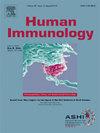组织相容性实验室的地理分布一览。
IF 2.2
4区 医学
Q3 IMMUNOLOGY
引用次数: 0
摘要
组织相容性实验室(HLs)提供必要的组织相容性和免疫遗传学(H&I)测试,以支持器官和干细胞移植,疾病诊断和HLA变异相关药物诱导不良反应的风险评估等。它们的地理分布和提供监管监督的认证组织从未被介绍过。为了了解hl的特征及其全球分布,美国组织相容性和免疫遗传学学会(ASHI)认证审查委员会(ARB)成立了一个工作组来收集这些数据。我们的研究表明,至少有593家HLs在58个国家和6大洲提供常规检测服务,其中有两个主要组织,ASHI和EFI提供认证。这里提供的数据表明,高收入者的分布在很大程度上取决于他们所在国家和地理区域的规模和经济发展。本报告强调了标准化的好处,以及全球范围内HLs与专业组织相容性和免疫遗传学协会和组织之间合作的潜力。本文章由计算机程序翻译,如有差异,请以英文原文为准。
A glance at the geographical distribution of histocompatibility laboratories
Histocompatibility laboratories (HLs) provide essential histocompatibility and immunogenetics (H&I) testing in support of organ and stem cell transplantation, diagnosis of diseases and risk assessment of drug-induced adverse reactions associated with HLA variants, and beyond. Their geographical distribution and the accreditation organizations that provide regulatory oversight have never been profiled. To understand the characteristics of HLs and their global distribution, a taskforce was established by the American Society for Histocompatibility and Immunogenetics (ASHI) Accreditation Review Board (ARB) to gather this data. Our study indicates there are at least 593 HLs routinely providing testing services across 58 countries and 6 continents, with two major organizations, ASHI and EFI, providing accreditation. The data presented here indicates that the distribution of HLs highly depends on the size and economic development of the countries and geographical areas where they are located. This report highlights the benefits of standardization and potential for cooperation among HLs and professional histocompatibility and immunogenetics societies and organizations worldwide.
求助全文
通过发布文献求助,成功后即可免费获取论文全文。
去求助
来源期刊

Human Immunology
医学-免疫学
CiteScore
5.40
自引率
7.40%
发文量
107
审稿时长
12 days
期刊介绍:
The journal''s scope includes understanding the genetic and functional mechanisms that distinguish human individuals in their immune responses to allografts, pregnancy, infections or vaccines as well as the immune responses that lead to autoimmunity, allergy or drug hypersensitivity. It also includes examining the distribution of the genes controlling these responses in populations.
Research areas include:
Studies of the genetics, genomics, polymorphism, evolution, and population distribution of immune-related genes
Studies of the expression, structure and function of the products of immune-related genes
Immunogenetics of susceptibility to infectious and autoimmune disease, and allergy
The role of the immune-related genes in hematopoietic stem cell, solid organ, and vascularized composite allograft transplant
Histocompatibility studies including alloantibodies, epitope definition, and T cell alloreactivity
Studies of immunologic tolerance and pregnancy
T cell, B cell, NK and regulatory cell functions, particularly related to subjects within the journal''s scope
Pharmacogenomics and vaccine development in the context of immune-related genes
Human Immunology considers immune-related genes to include those encoding classical and non-classical HLA, KIR, MIC, minor histocompatibility antigens (mHAg), immunoglobulins, TCR, BCR, proteins involved in antigen processing and presentation, complement, Fc receptors, chemokines and cytokines. Other immune-related genes may be considered.
Human Immunology is also interested in bioinformatics of immune-related genes and organizational topics impacting laboratory processes, organ allocation, clinical strategies, and registries related to autoimmunity and transplantation.
 求助内容:
求助内容: 应助结果提醒方式:
应助结果提醒方式:


